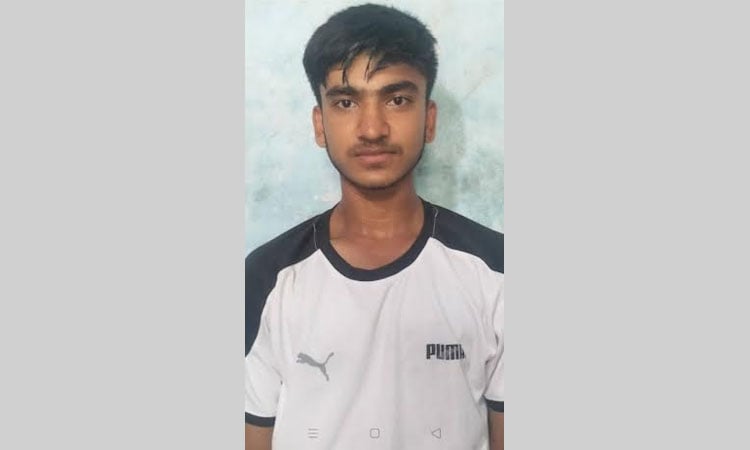
By Borun Kumar Dash
DHAKA, June 1, 2025 (BSS) – Eighteen -year-old Zahid Hossain sacrificed life for his firm determination to oust fascist Sheikh Hasina ending her nearly 16-year brutal regime.
“If you want, you can fall back. I will go ahead. I will become a martyr if needed. But I must go,” these were the defiant last words of 18-year-old Zahid Hossain to his friends on the fateful afternoon of July 19, moments before he was shot in the head and brutally beaten to death near Dhaka’s Mohakhali rail gate during the July mass uprising.
“It was July 19. There were bullets flying, sound grenades exploding. His friends were scared and tried to pull back. But Zahid told them, ‘You all may go. I will go forward, even if I have to die.’ And he ran toward the frontline,” Rahela Begum, shared the harrowing details of that day with BSS from their small rented tin-roofed room in Nakhalpara.
Her voice trembled as she recounted the story she had gathered from her son’s friends who witnessed his final moments of Zahid who embraced martyrdom for the country during July-August student-led mass uprising that ousted prime minister Sheikh Hasina bringing an end to 16 years of dictatorship.
The protest, part of the nationwide July movement, had engulfed several parts of the city. Police were firing continuously from elevated positions on the Mohakhali flyover and protesters were responding with bricks and slogans, determined to resist. As Zahid reached the foot of the flyover, a bullet pierced his head.
What followed, according to witnesses, was even more horrifying. “He stood there for a few moments, bleeding but trying to hold his ground,” said his elder brother, Rahat Hossain. “Then chhatra league men in helmets—carrying sticks and rods—ran at him and started beating him senseless. The police stood right there. They didn’t stop it.”
Rahela added, “When they realized he was still breathing, one of them kicked him to make sure he was dead. Only then did they leave him.”
Bystanders and other protesters eventually carried Zahid’s bloodied body to Universal Medical College Hospital. Despite desperate efforts, the doctors could not save him. “The bleeding wouldn’t stop,” Rahela said, holding back tears.
Zahid’s death has devastated his family and community. He was the second of three children. His father, Jahangir Alam (45), sells flowers in local markets. Zahid had dropped out after class seven to support the family, working with his father.
“We are poor people,” Jahangir said. “He used to wake up early and help me sell flowers. His income was what kept our home running.”
Rahela remembered every detail of Zahid’s last day. “It was Friday. I let him out for Jumma prayers, but only after locking him inside the house in the morning to stop him from going to the protest,” she said. “He wore his favorite white panjabi. After lunch, he lay on my lap and asked me to comb his hair. That was the last peaceful moment we had.”
Later that afternoon, as the sounds of gunfire echoed through Nakhalpara, Rahela and Zahid stood outside trying to understand what was happening. “He was right beside me. The next moment, he was gone.”
Unbeknownst to his family, Zahid had already been wounded the previous day during another protest. “He came home with rubber pellets in his body but didn’t tell anyone,” said Rahela. “He didn’t want to worry us.”
Zahid’s mother said, “They accused my son of being a terrorist. He was just a boy who helped his father sell flowers. What kind of terrorist was he? He didn’t even complete school. He just went to the protest.”
After Zahid’s death, a group of police personnel allegedly tried to seize his body from the hospital to cover up the incident. But his friends and local residents intervened. “They wheeled his body out on a trolley and hid it in a nearby alley,” said Zahid’s brother Rahat.
That night, fearing backlash, local mosques refused to allow funeral services. Zahid’s body was finally washed and shrouded at Haji Moran Ali Madrasa and buried at the Rahim Metal graveyard. But the ordeal didn’t end there. The grieving family soon became a target of further police action.
“Shortly after the burial, police came looking for my elder son,” said Jahangir. “They raided our house and nearby areas. Everyone was terrified. People left the neighborhood. It became a ghost town.”
Local teenagers—some as young as 14—were detained and allegedly tortured. “They were forced to confess they were acting on political orders from the opposition,” Rahela said. “They even labeled the children as BNP activists.”
To escape the crackdown, Zahid’s family fled to their hometown in Nabinagar, Brahmanbaria. But peace remained elusive. “The police came after us even in the village, asking about Rahat,” Jahangir said.
Jahangir broke down recalling how Zahid’s mother now lives with only memories. “She holds on to his white panjabi, smells it, kisses his photos, and cries all day.”
Rahat, his voice choked with grief, recalled how Zahid wanted to protect him. “He told me, ‘You stay back. Take care of Amma and Abbu.’ He didn’t want me to get involved.”
Asked if the family had taken legal action, Jahangir replied, “We couldn’t do anything right away. We were running for our lives. But after the change in government, we returned and filed a case on September 30 at Tejgaon Police Station.”
The case names ousted Prime Minister Sheikh Hasina, leaders and members of Awami League, Chhatra League, Jubo League, and around 100 to 150 police officers for their alleged involvement in Zahid’s death.
“We don’t want revenge,” Jahangir said. “We just want justice for our son.” He sacrificed life for his country…. he is a martyr.”